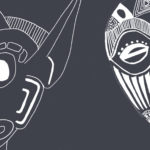This is a guest post by Kate Debling, University of Exeter.
On 8th April 2021, PhD candidate Bradley Osborne and Postdoctoral Research Fellow Dr Arabella Currie, led a virtual symposium on the work of William Golding, with the support of the Leverhulme Trust and the University of Exeter.
The six-hour event brought together academics, students and Golding enthusiasts from national and international institutions, who presented academic papers under four themes: beyond original sin, beyond the self, beyond masculinities and beyond Gaia: Golding and Science Fiction. Golding’s daughter, Judy Carver, and son-in-law, Terrell Carver, also joined the event. The symposium not only showcased emerging scholarship on the author but also brought new insights into his works. Each panel was followed by a question and answer section (Q&A) to allow for group discussion.
The event began with an introduction from its hosts — according to Osborne and Currie, the title ‘Beyond Good and Evil’ was chosen to inspire serious thinking about Golding and give him renewed critical attention. This was followed by a presentation by Christine Faunch, head of Heritage Collections at the University of Exeter, who gave an insight into the literary archives of Golding held in the Special Collections. The Golding archive is essential to research conducted at the University of Exeter and has even inspired undergraduate teaching.
Panel one began with William Stephenson’s (University of Chester) academic paper: ‘ “What a world a ship is! A universe!”: To the Ends of the Earth: A Sea Trilogy and Technology (1980-1989)’. The talk looked at Rites of Passage (1980), Close Quarters (1987) and Fire Down Below (1989), and Golding’s exploration of environment and technology under a post humanist lens. Further discussion prompted analysis of themes such as class and capitalism and how human error leads to a world of dwindling resources, reminiscent of the modern-day climate crisis.
Next, Arnab Chatterjee (Budge Budge Institute of Technology, Kolkata) presented his paper: ‘(Dis)-location as a Dystopian Trope: Reading the Dismembered and the Traumatised in Golding’s Pincher Martin (1956) and Mohsin Hamid’s Exit West.’ In comparing the novels thematically and textually, Chatterjee explored the parallels between dystopian narratives and Golding’s work. Principal themes of the paper included fragmented existence, fluid geography and trauma, all contributing to a sense of dislocation and dismemberment, that blurs the boundaries between reality and fantasy. In the Q&A section, both Chatterjee and Stephenson discussed Golding’s works as a new genre of writing, in which traditional literary frameworks were turned upside down, particularly in the case of the science-fiction genre. This allowed Golding to explore the innate depravity of the human spirit, as well as the implications of a growing reliance on technology on human consciousness.
In between the first and second panel, filmmaker Adam Gutch introduced his upcoming adaptation of Golding’s The Inheritors (1955), which is currently in production. Through the animated medium, Gutch aims to draw out themes such as the destruction of the environment and a fear of otherness that permeate Golding’s book. Having first read the novel at age fourteen, Adam intends to stay close to the spirit of the original text, and he feels that the abstract nature of animation is the best means of achieving that.
Panel two was chaired by University of Exeter professor, Tim Kendall. Demet Karabulut Dede (University of Exeter) continued the event’s exploration of Golding’s 1955 novel with her paper: ‘ “With the scent of the other I am the Other”: Sensory Input and its Affect in William Golding’s The Inheritors‘.Rooting her discussion in Affect theory, Karabulut discussed the sensory experience represented in the prehistoric fiction when encountering the other, as well as suggested that interdependence between humans and the environment is a core part of the human condition under Golding. In discussing the moral or didactic undertones of the text in the Q&A session, Karabulut drew on Golding’s position as a teacher and his controversial need to convey messages about the human condition to children.
Building on previous discussion of Golding’s significance in education, Cristina Ferreira Pinto and Sofia de Melo Araújo (Polytechnic Institute of Porto) presented their research on the reception of Golding’s work in schools. Their paper, ‘ “I cannot do your homework for you”: William Golding’s Lord of the Flies read in primary school and Higher Education’, explored the educational frameworks around Golding’s novels, including their layout in study books. Both attested that despite the controversy of Lord of the Flies, its literary quality and pertinent themes mean it continues to be a staple text within modern education. Indeed, through character education, they felt that children could be exposed to debates in ethics and culture, while still challenging outdated philosophical ideas.
The third panel was chaired by Currie, who introduced Nicola Presley (Bath Spa University) and Anactoria Clarke. In her paper, ‘ “Why aren’t there more women in your books?”: Ann and William Golding’, Presley shed light on the importance of wife Ann Golding in the writer’s career. Examining manuscripts from the Golding archives, comments from Ann (handwritten by Golding) emphasised her involvement in the refinement of texts, beginning with his debut novel Lord of the Flies and concluding with his final work, The Double Tongue, which was published posthumously.
Anactoria Clarke followed with an in-depth analysis of Golding’s engagement with classics in her paper, ‘Politics and Prophecy in The Double Tongue.’ In particular, Clarke drew on the fact that Golding shares the fate of many ancient texts, being published after the author has died. She stated: ‘full of ambiguity and opportunity for speculation, Golding’s text displays a complicated relationship to the ancient world and ancient sources’.
In the final panel, ‘Beyond Gaia: Golding and Science Fiction’, bestselling sci-fi novelist Una McCormack and award-winning speculative fiction novelist Nina Allan, looked at Golding’s The Spire (1964) and Darkness Visible (1979). Building on William Stephenson’s paper, McCormack argued that Golding ‘took the apparatus of the science-fiction genre and removed its scaffolding with incredible skill, creating a text that understood the potential and the limits of the literary mode’.
In the Q&A section, Allan stated that: ‘speculative fiction can be a radical expression of a literary intent, and Golding is that in spades’. The talks also tapped into the shifting attitudes towards science fiction and speculative literature over time.
The closing discussion certainly brought the attendees back to the event’s principal aim — to suggest new ways of reading Golding – and shed light on the complexity of his works. Indeed, the symposium highlighted that it is far too simplistic to associate the writer with either good or evil, but rather the space in between, the exploration of human nature and the wider natural world, is at the heart of Golding’s canon.

